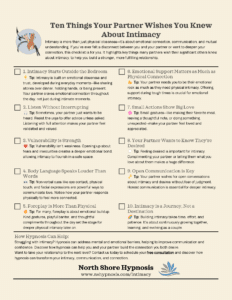
Summary
Vulnerability is often perceived as a weakness, but in truth, it’s the secret ingredient that binds people closer together. By embracing vulnerability, you open yourself up to deeper connections, healthier communication, and transformative growth—both personally and within your relationships. In this post, we’ll explore why letting your guard down can revolutionize how you relate to others. We’ll also share practical tips on how to develop genuine openness and address the fears that hold you back. Finally, we’ll dive into how intimacy coaching and hypnosis can be powerful tools for overcoming these barriers, drawing on insights from our client-centered hypnosis practice at North Shore Hypnosis in Amesbury, MA.
Introduction: Why Vulnerability Matters
Vulnerability is a cornerstone of healthy, fulfilling relationships—romantic, familial, or platonic. Yet, many of us associate being vulnerable with weakness, embarrassment, or even shame. We live in a culture that praises self-reliance and independence. When we let down our guard—revealing our insecurities, fears, or desires—our primal instinct warns us that we might be rejected or judged. However, vulnerability is the key to genuine connections. It helps you break down walls of misunderstanding, fosters empathy, and boosts intimacy in ways that superficial interactions never can.
The journey toward embracing vulnerability involves self-awareness, compassion (toward both yourself and others), and the willingness to be seen for who you truly are. It can be a daunting process, but it’s also an incredibly rewarding one. In our intimacy coaching sessions at North Shore Hypnosis, we see firsthand how transformative and liberating it can be to release years of pent-up fears and self-judgment.
Understanding the Risks and Rewards
- Risk of Rejection or Judgment
One reason people avoid vulnerability is the fear of rejection or criticism. After all, if we keep our insecurities locked away, no one can trample on them—right? While this might feel safe in the short term, it also prevents you from experiencing genuine connection, empathy, and mutual understanding. - Reward of Authentic Connection
Paradoxically, when you dare to open up about your deepest emotions and experiences, you pave the way for a more authentic bond. Your openness can encourage others to do the same, generating a cycle of trust and understanding that strengthens your relationships.
The Role of Self-Awareness
Before you share yourself openly with a partner or friend, you need to understand your own emotional landscape. Ask yourself:
- What insecurities do I have about relationships or intimacy?
- Where might my fear of judgment come from—childhood experiences, past relationship traumas, cultural beliefs?
- How have I responded to vulnerability in the past, and what do I want to change?
Self-awareness sets the stage for intentional, responsible vulnerability. It’s about recognizing that your feelings and experiences are valid, that you have every right to voice them, and that doing so can free you from self-imposed limitations.
For more on understanding your inner fears and anxieties, you may find it helpful to explore Hypnosis for Stress and Anxiety or learn about the Stress Effects on the Body. Such resources can offer insight into the physiological and psychological processes that might be hindering your emotional openness.
Building Emotional Intimacy Through Openness
- Communicate Your Needs and Feelings
Clear, honest communication forms the bedrock of any close relationship. When you share your emotions and needs, you give your partner the opportunity to support and understand you. If you keep those needs hidden out of fear—fear of being a burden, fear of seeming weak, fear of scaring someone off—you allow resentment and misunderstandings to build up.
- Practical Tip: Start with small disclosures. For instance, share a stressor from your day or admit a personal worry. Notice how the other person responds—chances are, they’ll appreciate your willingness to open up and reciprocate with empathy.
For more on how to strengthen communication and openness, read our blog post on Enhancing Communication in Intimate Relationships with Hypnosis.
- Practice Active Listening
Being vulnerable isn’t just about talking—it’s equally about listening. Listen to your partner without jumping to defend yourself or downplay their concerns. When you listen with empathy, you validate the speaker’s experience, showing them it’s safe to share and be vulnerable.
- Practical Tip: Put away distractions like phones and laptops. Maintain eye contact, reflect back what they say, and ask clarifying questions. This encourages a supportive, two-way flow of emotional openness.
- Allow Yourself to Receive Support
Sometimes, it’s easier to give help than to receive it. Accepting help or emotional support can make us feel indebted or needy. But remember, healthy relationships thrive on reciprocity. Let your loved ones show up for you. Accepting their support fosters deeper attachment and helps them feel valued.
- Practical Tip: The next time someone offers to lighten your load—be it with household tasks or emotional support—say “thank you,” and mean it. Notice how this small shift helps you feel more connected.
Overcoming Emotional Barriers
- Past Trauma or Negative Experiences
Your history plays a significant role in how open you are today. If you have been hurt in past relationships, your mind might be wired to associate vulnerability with pain. Recognizing these patterns is the first step toward breaking them. Therapy or hypnosis can help rewire these associations, creating safer mental spaces for you to practice being open.
For individuals struggling with deeper intimacy issues stemming from trauma, exploring Using Hypnosis to Treat Sexual Dysfunction or Understanding Premature Ejaculation: Definition, Effects, and Causes might shed light on the subconscious roots of emotional and physical challenges.
- Fear of Abandonment
Fear of being left behind can lead to clinging or the opposite—pushing people away to avoid being hurt first. Recognizing this fear can help you take measured steps toward vulnerability while also maintaining healthy boundaries.
- Practical Tip: Journaling about your fears can help you process them. Speak them out loud or discuss them with a trusted friend or professional. The very act of naming your fear dilutes its power.
- Internalized Shame and Guilt
Feelings of shame and guilt can strongly inhibit emotional and sexual intimacy. People often hide aspects of themselves because they believe they’re “not good enough” or “broken.” In reality, everyone experiences moments of doubt. If you’d like to explore the impact of shame on intimacy further, check out Effects of Shame and Guilt on Sex or Overcoming Sexual Shame and Guilt with Hypnosis: Unlocking Your Authentic Self.
How Hypnosis and Intimacy Coaching Can Help
At North Shore Hypnosis in Amesbury, MA, we specialize in helping individuals and couples move past the barriers that keep them from genuine, fulfilling intimacy. Whether you’re dealing with residual anxiety, traumatic memories, or simply a pattern of defensiveness, hypnosis can help you:
- Access Subconscious Beliefs – Hypnosis allows you to explore and reframe the deep-seated thoughts that feed shame, fear, and self-doubt.
- Replace Negative Self-Talk – Through guided suggestions, you can shift your internal dialogue, fostering a sense of worthiness and readiness to embrace vulnerability.
- Practice Relaxation and Mindfulness – Many people struggle with anxiety when discussing personal issues. Hypnosis techniques like bilateral stimulation (explored here: Bilateral Stimulation for Stress and Anxiety: A Promising Therapeutic Approach) can help you remain calm as you talk about sensitive topics.
- Develop Self-Compassion – Hypnosis nurtures self-compassion, reminding you that it’s human to have flaws, doubts, and insecurities. This emotional acceptance acts as a springboard for deeper connections with others.
To learn more about leveraging hypnosis for emotional and sexual well-being, explore our post on Using Hypnosis to Enhance Intimacy and Strengthen Relationships.
Practical Tips for Embracing Vulnerability
- Start Small with Daily Check-Ins
Share one genuine feeling with your partner each day—something you might typically keep to yourself. It could be as simple as “I felt insecure at work today” or “I’m worried about our finances.” Over time, you’ll become more comfortable voicing deeper emotions and concerns. - Schedule Dedicated “Vulnerability Sessions”
Set aside time (weekly or monthly) to talk openly without distractions. Use this space to discuss anything weighing on your mind or to express appreciation for one another. Knowing you have a designated time to be open can remove the pressure of “finding the right moment.” - Create a Non-Judgment Zone
Establish ground rules for these discussions, such as no interrupting, no belittling, and no jumping to problem-solving unless asked. The goal is to listen and validate. - Seek Professional Help if Needed
If the fear of being vulnerable is rooted in deep traumas or long-standing relationship patterns, consider seeking the guidance of a therapist or a specialized hypnosis practitioner. Professionals can offer personalized strategies to gently dismantle these barriers.
The Connection Between Vulnerability and Sexual Intimacy
Emotional vulnerability directly impacts sexual satisfaction. When both partners trust each other enough to be open about their desires, fantasies, and insecurities, the level of physical and emotional fulfillment skyrockets.
- Addressing Sexual Performance Anxiety
Many individuals grapple with sexual performance anxiety, fearing they’ll be judged or that they won’t meet their partner’s expectations. Using Hypnosis to Help Improve Sexual Performance Anxiety can provide a structured framework to dismantle these fears and replace them with a sense of confidence and relaxation. - Fostering a Safe Environment for Exploration
When both partners feel secure enough to say “I’m not sure if I like this” or “I’d love to try something new,” that’s a sign you’ve established a culture of vulnerability. Mutual respect and open-minded communication become the norm, allowing your sexual relationship to evolve and flourish.
Addressing Setbacks and Continual Growth
Embracing vulnerability isn’t a one-time event—it’s an ongoing practice. Old habits and fears can resurface, especially during stressful times. You might catch yourself withdrawing or bottling things up again. Recognize this as part of the journey rather than a failure. Return to your coping tools—journaling, meditation, hypnosis, or talking with a trusted friend or coach.
For guidance on navigating stress that may impede emotional intimacy, you can explore Using Hypnosis to Beat Stress and Anxiety or discover how to Improve Your Sleep Quality and Reduce Stress—both of which can drastically affect your emotional well-being.
The Ripple Effect of Vulnerability
When you decide to embrace vulnerability in your relationships, you’ll likely find that many aspects of your life improve:
- Better Communication at Work
Confidence in emotional expression can lead to healthier boundaries and more collaborative work relationships. - More Authentic Friendships
Sharing personal triumphs and tribulations fosters deep, supportive friendships. - Enhanced Self-Esteem
Knowing you can show up fully as yourself—and still be valued—reinforces a positive self-image.
Conclusion: A Life of Openness and Fulfillment
Choosing vulnerability is like stepping into a warm beam of light after years of hiding in the shadows. It might feel exposed at first, but as you adjust to the radiance, you’ll realize it’s where meaningful connection resides. You don’t have to traverse this path alone. Whether it’s leaning on friends, family, professionals, or resources like our Intimacy Coaching and hypnosis services, you have avenues of support. Each time you open up, you give others permission to do the same—together, building a culture of understanding, empathy, and deep, abiding love.
Ready to embrace vulnerability and deepen your connections?
At North Shore Hypnosis, we offer client-centered hypnosis and Intimacy Coaching services in Amesbury, MA, guiding you toward healthier communication, greater trust, and more satisfying relationships. Contact us today and begin your journey toward genuine openness and connection.
Learn Ten Things Your Partner Wishes You Knew About Intimacy

Do you want to have better intimate relationships? Discover ten things your partner wants you to know to have more fulfilling relationships.
Click now for your free checklist, “Ten Things Your Partner Wishes You Knew About Intimacy.

